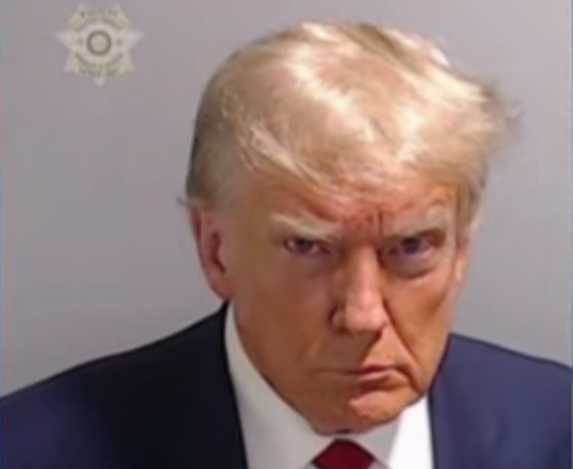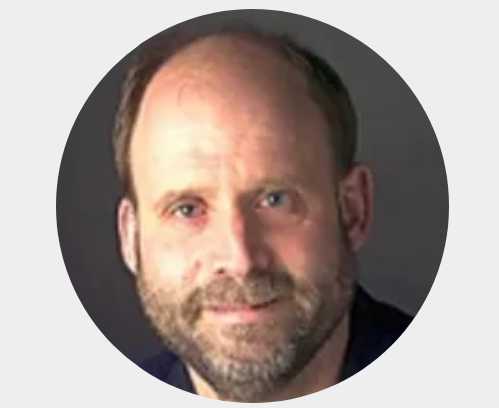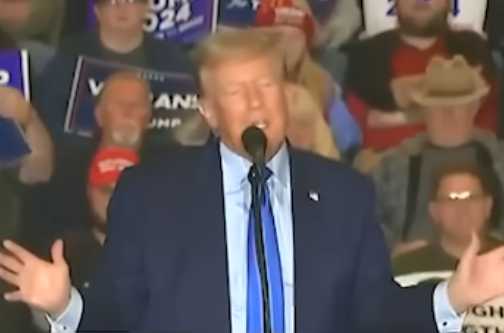“If it wasn’t already clear, our democracy is in very serious danger.”
Former U.S. President Donald Trump is the GOP front-runner for 2024, setting up an expected rematch with Democratic President Joe Biden, but American media coverage of the Republican’s campaign is already showing that many journalists didn’t learn important lessons about how to report on his extremism, according to recent analyses.
During a Saturday rally, Trump pledged to “root out the communist, Marxist, fascist, and the radical left thugs that live like vermin within the confines of our country, that lie and steal and cheat on elections and will do anything possible—they’ll do anything, whether legally or illegally—to destroy America and to destroy the American dream.”
“The real threat is not from the radical right; the real threat is from the radical left, and it’s growing every day, every single day. The threat from outside forces is far less sinister, dangerous, and grave than the threat from within,” added Trump—who currently faces four criminal cases, two of which relate to his efforts to overturn his 2020 loss.
As Common Dreams reported, Trump’s openly fascistic comments on Saturday quickly drew comparisons to Nazi rhetoric, particularly the use of the word “vermin.”
[perfectpullquote align=”full” bordertop=”false” cite=”” link=”” color=”” class=”” size=””]”The press must get across to American citizens the crucial importance of this election and the dangers of a Trump win.”[/perfectpullquote]
“This is straight-up Nazi talk, in a way he’s never done quite before. To announce that the real enemy is domestic and then to speak of that enemy in subhuman terms is Fascism 101. Especially that particular word,” The New Republic editor Michael Tomasky wrote Sunday, referencing some antisemitic content from the 1930s and ’40s.
“Trump’s rats are a much broader category,” Tomasky continued, “and in that sense an even more dangerous one—he means whoever manages to offend him while exercising their constitutionally guaranteed right to register dissent and to criticize him.”
And yet, as Philadelphia Inquirer columnist Will Bunch emphasized Sunday, “in one of the most perilous moments of crisis the world has seen in 75 years, and with the basic notions of free speech under assault, most newsrooms aren’t fighting back. They are, instead, pulling their punches in a defensive, ‘rope-a-dope’ crouch, and thus failing to truly inform—when democracy itself is at risk.”
Sounds…fascist.
We can’t let this man anywhere near the Oval Office again. Our democracy is at stake. https://t.co/XAOmcU4Mf2
— Sean Eldridge (@SeanEldridge) November 13, 2023
Media Matters for America senior fellow Matt Gertz noted Monday that “if you rely on the news divisions of the Big Three broadcast networks, you haven’t seen the chilling footage of Trump’s remarks” from Saturday.
According to Gertz:
CBS News and ABC News have not mentioned Trump’s remarks at all on their morning news, evening news, or Sunday morning political talk shows.
NBC News also did not discuss them on its morning and evening news broadcasts, and “Meet The Press'” sole coverage consisted of host Kristen Welker reading the comment to Republican National Committee Chair Ronna McDaniel and asking her, “Are you comfortable with this language coming from the GOP front-runner?” (McDaniel declined to comment).
The nation’s most-read newspapers are similarly not treating these remarks as a major story.
Trump’s comments did catch the attention of MSNBC host Mehdi Hasan, who addressed them Sunday evening during his monologue and in a discussion with Yale University philosophy professor Jason Stanley, a fascism expert
“From punishing his political opponents to locking up immigrants in camps to deploying the military – all while echoing the hateful rhetoric of Hitler – we know what we can expect if [Trump] retakes the White House.”
My monologue today on Trump& “vermin”:pic.twitter.com/M5w4RiQtHx
— Mehdi Hasan (@mehdirhasan) November 13, 2023
However, Trump’s weekend remarks and a failure to adequately cover them fit into a larger pattern that includes MSNBC.
Media Matters data integrity analyst Harrison Ray last week highlighted how CNN, Fox News, and MSNBC have handled other comments from the GOP presidential candidate:
Trump has recently vowed to implement “ideological screening” for migrants, saying he’d turn away anyone who doesn’t like “our religion”; accused “liberal Jews” of voting “to destroy America and Israel”; claimed migrants are “poisoning the blood of our country”; and complimented the terrorist group Hezbollah as “very smart.
Yet these extreme and alarming statements received scant coverage across major TV news networks: Three of the four comments received no more than 22 minutes of attention each, with only one nearing an hour.
“Despite—or perhaps due to—the frequency of Trump’s extreme comments, TV news networks are seemingly desensitized to his rhetoric,” Ray wrote. “The networks have shown they are capable of covering such extremism—as Joint Chiefs of Staff head Mark Milley was retiring, networks eventually got around to covering Trump’s suggestion that the general deserved to be executed—but often they regularly choose to ignore the GOP front-runner’s inflammatory commentary.”
Along with reporting on that analysis last week, Salon‘s Areeba Shah spoke with academics and experts who also shared concerns that U.S. journalists aren’t treating Trump’s extremism with a necessary seriousness.
“If we don’t call out the rhetoric as extreme, we risk making it normal and acceptable,” warned Libby Hemphill, a professor at the University of Michigan’s School of Information and the Institute for Social Research.
University of Kansas political science professor Donald Haider-Markel, who studies domestic extremism, similarly told Shah that “when his dehumanizing comments are not challenged by the news media, viewers go along. If the dehumanization sticks, it makes support of political violence against ‘enemies’ more likely.”
“I think you already see the consequences of underreporting and normalizing his rhetoric in polling about the 2024 race—in many polls Trump is running even or ahead of Biden even with his ever more extreme rhetoric,” he said. “The news media has not learned any lessons from the period 2015-2020 and is covering him as a normal candidate doing and saying normal candidate things.”
Trump’s embrace of fascism is becoming increasingly overt, as he labels his opponents as “vermin,” promises mass detention camps, and claims that immigrants are “poisoning the blood of our country.” It’s time we call this what it is. pic.twitter.com/1usLKrVibN
— Robert Reich (@RBReich) November 12, 2023
Global Project Against Hate and Extremism (GPAHE) co-founder Heidi Beirich stressed to Shah that given Trump’s chances of winning the presidential race next year, “the public needs to know about policy plans, such as the program being designed for the next conservative president by the Heritage Foundation, called Project 2025.”
For the past several months, critics have highlighted various concerns with Project 2025, from policies on the fossil fuel-driven climate emergency and LGBTQ+ rights to—as Common Dreams opinion contributor Thom Hartmann pointed out earlier this year—its “consolidation of power in the hands of the president, reflecting the way government is run in Hungary, China, and Russia rather than the checks-and-balances envisioned by our nation’s founders.”
GPAHE on Monday released a detailed analysis of the project, which “threatens Americans’ civil and human rights, and is an attack on our very democracy,” according to Beirich.
“Our country is facing an authoritarian threat from far-right extremists and Christian Nationalists in a new, unique, and frightening way,” said GPAHE co-founder Wendy Via. “Voters, political figures, and the media must be on alert that Project 2025 is an authoritarian roadmap to dismantling a thriving, inclusive democracy for all.”
Some journalists warn that Trump’s recent rhetoric, given his past record, should be taken more seriously by both the press and the public.
“Do I think Trump will imprison political dissidents in the concentration camps? I don’t know if he will, but I do know that it would be quite easy for him to justify putting political dissidents in concentration camps, based on things he has already said and promised to do,” Current Affairs‘ Nathan J. Robinson wrote Monday. “We know he wants to build sprawling camps and start rounding people up. We know he wants to root out internal threats. And we know he couldn’t care less about the law. Personally I do not feel reassured.”
“If it wasn’t already clear, our democracy is in very serious danger and everyone needs to wake up to the threat,” Robinson asserted. “Once new prison camps are built, they do not tend to close down. The time for stopping them is before they get built. It’s important to see major historical threats coming, before it’s too late to change course.”
Trump’s rhetoric is becoming downright terrifying in its drift toward outright fascism. He’s now vowing to build vast internment camps, while calling opponents vermin and vowing to “root out” “internal threats.” Alarm bells should be blaring: https://t.co/RgItuD7C1a pic.twitter.com/O6i6skO8vY
— Nathan J Robinson (@NathanJRobinson) November 13, 2023
American journalist Margaret Sullivan wrote in her column for The Guardian last week that “the press must get across to American citizens the crucial importance of this election and the dangers of a Trump win. They don’t need to surrender their journalistic independence to do so or be ‘in the tank’ for Biden or anyone else.”
Sullivan’s recommendations for U.S. newsrooms included:
Report more—much more—about what Trump would do, post-election. Ask voters directly whether they are comfortable with those plans, and report on that. Display these stories prominently, and then do it again soon.
Use direct language, not couched in scaredy-cat false equivalence, about the dangers of a second Trump presidency.
Pin down Republicans about whether they support Trump’s lies and autocratic plans.
“It’s the media’s responsibility to grab American voters by the lapels,” she argued, “not just to nod to the topic politely from time to time.”
Common Dream’s work is licensed under a Creative Commons Attribution-Share Alike 3.0 License. Feel free to republish and share widely.
[content id=”79272″]








